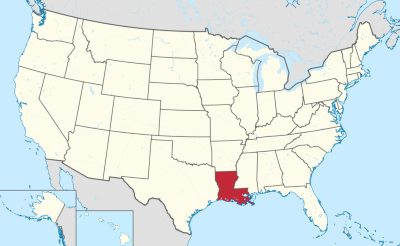Here you’ll find the largest list with Louisiana hosting reviews. We’ve listed all Louisiana web hosting providers with our UNCENSORED review and that of users.

Quick Facts
Internet Speed: 21.7 Mbps downlink; 12.9 Mbps uplink
Population: 4.8 million
Internet Coverage: 85% of residents
Main Internet services: Cable, DSL, Fiber
Main Internet Service Providers: Cox Communications, AT&T
Colocation Datacenters: 11
Colocation Market: Emerging
Internet in Louisiana
According to Akamai.com, the average downlink Internet speed in Louisiana is 21.7 Mbps and the average uplink speed is 12.9 Mbps.
In 2016, the population of Louisiana was roughly 4.8 million. Over 85% of residents have access to the Internet, especially broadband connections.
Main Internet services provided in Louisiana are as follows:
– Cable – over 90% coverage
– DSL – over 79% coverage
– Fiber – less than 25% coverage
Main Internet Service Providers located in Louisiana are the following:
– Cox Communications (Cable) – 90% availability
– AT&T (DSL) – 80% availability
– Cox Communications (Fiber) – less than 10% availability
Gigabit Internet in Louisiana
Gigabit Internet services are seeing moderate expansion when compared to the preceding years, as reflected by the penetration rate of roughly 20%. Gigabit Internet is mostly available for businesses, but also for residential customers located in select areas in New Orleans and other developed cities. AT&T provides gigabit Internet services to businesses, while Cox’s clientele consists mainly of residential customers. Other regional ISPs also provide gigabit Internet.
Colocation Datacenters in Louisiana
According to datacentermap.com, there are currently 11 colocation datacenters in Louisiana. Most datacenters are located in New Orleans (5), followed by Baton Rouge (3), as well as other smaller cities such as Alexandria (2) and Shreveport (1).
– EdgeConnex
– Cogent Communications, Inc.
– Level 3 Communications
– Fogo Datacenters
One of the largest colocation providers located in New Orleans is Cogent Communications. This company owns a 7,800-square-foot facility located in the central business district of New Orleans, and provides retail colocation services to a wide array of customers. Amenities include: 180Kva UPS Unit, D/C Plant, 4 Vortex Lorain D/C rectifiers, Cummins Diesel Generator, 1.150Kw PDU, along with many others. Carrier neutrality is ensured by means of unconditioned on-site access to major telecoms and carrier hotels located in close proximity.
Another important colocation provider located in New Orleans is Fogo Data Centers. This company operates a state-of-the-art facility located in a favorable New Orleans location, and serves as one of the region’s most important datacenters for retail colocation services. Amenities include: dual substation power feeds, dual AC UPS power, dual emergency generators, N+1 Cooling, along with many others. The datacenter is carrier neutral, with access to key telecommunications providers.
Colocation Industry in Louisiana
Louisiana is not regarded as a prominent colocation market, and current trends do not indicate substantial growth in terms of colocation. However, the state may be able to claim the moniker of an “emerging market” pretty soon thanks to recent investments made by large national companies, such as Cogent and Level 3. The state is a great choice for customers either looking for cheaper colocation services relative to Texas, or for reliable disaster recovery solutions. New Orleans is the state’s hub for colocation services, although some providers have recently built in other cities, too.
Advantages for Colocation
This market exhibits a series of great advantages for colocation, and is as follows:
– close proximity to Texas and other emerging markets
– relatively cool weather, giving datacenters many hours of free cooling throughout the year
– developed technical infrastructure in New Orleans
Disadvantages for Colocation
There is, however, a series of disadvantages as well:
– very high natural disaster risk(1st in the U.S., according to various sources) – New Orleans, the hub for colocation in the state, is also very close to the Caribbean Sea
– not many datacenter tax breaks
– feeble supply of colocation space

